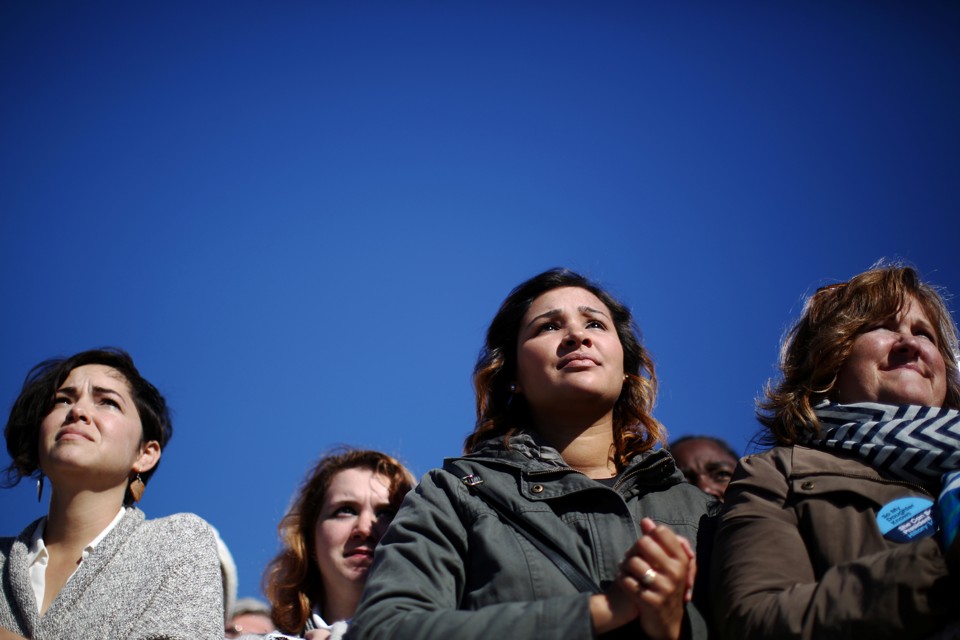##Text by Bilal Khbeiz
I don’t have much hope left. I’m using the little I have left to communicate the following as succinctly as possible:
If we were to really revitalize our democracy, exalt the culture of acceptance and interpret diversity as a positive value, then maybe it behooves us to capitalize on today’s momentum by addressing a few sticky issues in a fundamental, innovative way instead of wallowing and wailing over Trump’s ascendance to presidency.
Many of the people who voted for Obama the last two presidential election cycles voted for Trump this time around. Therefore, we can’t simply label them as a racist. Trump’s victory belies a structural crisis in modern democracies. I want to create a space for discussion by highlighting the below:
The Crisis of Belonging and Loyalty
There is no doubt that diversity, which democracies celebrate, has on the one hand weakened nationalistic fervor and resulted, in many locales and with many communities, in its eradication. Since wars motivated by national sovereignty are still fought, and since it’s highly likely that more serious wars are yet to come, any impartial observer of current events in America would realize that the groups forming American society are not as loyal to the US as they are to a constituent’s country of origin. In the event of a serious conflict with Mexico, for example, where would Latino Americans stand? This is a blatant expression of the failure of democracies in integrating immigrants and a clumsy gloating of celebrating diversity without scrutiny or understanding.
The Crisis of Urbanism
Cities have always been the crown jewels of modernity. Today they suffer from extreme violence for many reasons, some of which have little to do with the limits of personal choice. They stem from a far more dangerous dimension: losing all hope in the future. Sharp lines separate the street from its inhabitants. The excessive celebration of modern architectural monuments resembles the cathedrals and monasteries of the Middle Ages. Public services and infrastructures are breaking down. Prohibitive public laws and regulation are on the rise. One would have to fortify oneself before leaving the house: no smoking in public space, the use of bathrooms is prohibited for non-customers, no parking without prior notice. All of these limitations and many more induce frustration, impatience and anger. As a result, the individual is banished from the cathedrals of modernity to the streets where, with more rules and regulations, they have nothing left to do but walk endlessly as is the case of New Yorkers. That’s how George Orwell described the condition of the homeless in Paris and London in “Down and Out in Paris and London.”
Foreign Policy Despair
This matter particularly concerns the US more than other countries. Washington’s invested great effort by entering into agreement with Iran, which benefits the latter the most. And yet, the leadership in Iran will not cease to openly declare hostility against the US and publicly express preference to other countries at the expense of helping the Iraqi government’s fight against Daesh. Therefore, any “American” observer of foreign policy trajectories would realize the net losses that Washington has incurred because of this. It is a real, verifiable feeling despite its shortsightedness.
The Crisis of Employment
For decades, the American economy has evolved toward the production of superfluous intangible products, and has since developed applications to support it: smart phones, e-payment, mobile gaming, the construction of images, etc. All the while, jobs that create vital and necessary commodities are gone forever. This trend breeds fear and a lack of confidence in the future, especially in this era of cosmic anxiety. Citizens today do not feel secure in what they own: if you physically have two chickens then you know you will not starve for two days. But if you own a house with a mortgage, then any downturn in the stock market, which is entirely out of your control, will lead to loss of the value of your property while still having to pay high premiums on your loan for what is now a worthless commodity.
*Image of Clinton supporters in Cleveland by Carlos Barria / Reuters
